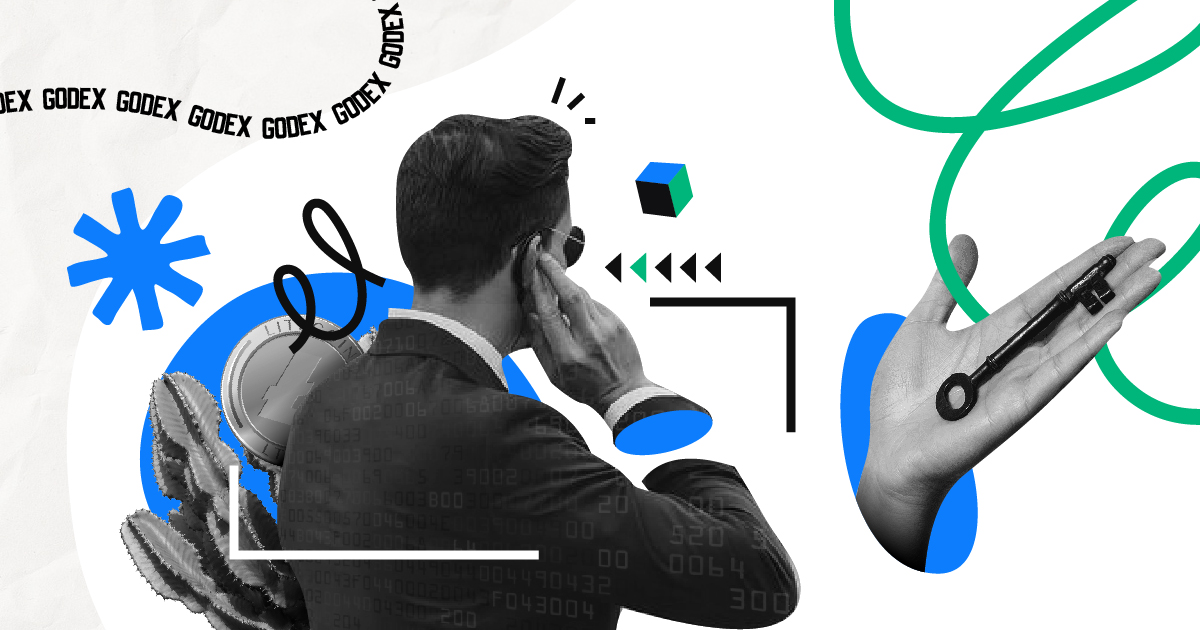Table of Contents
In recent years cryptocurrencies found their place among other financial assets within customers wallets all over the world. However, the security of crypto transactions remains the main concern for the people involved in them. The customers suffer from scammers of various kinds. Hackers steal personal data in every transaction, taking into account the vulnerability of crypto wallets. This market inefficiency led to the development of anonymous crypto exchanges like GoDex to guarantee a safe crypto exchange.
Why do you have to secure modern crypto transactions?
These days cryptocurrency again experiences the rise in popularity as more and more people seek the opportunity to keep their incomes secret and more companies want to guarantee the security of their transactions through the blockchain. In this respect, it is more important than ever to keep the wallets safe from the targeted attacks. As you understand the growing demand for crypto transactions attract hackers all over the world. Unfortunately, many people do not care much about the protection of their crypto funds and lose their funds forever.
Let’s dive into some statistics on crypto exchange security.
The two hundred billion market is incapable of offering safe crypto wallets to investors, according to the latest report from ICORating, researching 100 exchanges with more than $100 million turnovers. Indeed, the report indicated that numerous exchanges even fail to offer basic security measures such as eight-digit passwords.
The research showed that 54% of the world crypto exchanges are not secure in at least one area. This document identified the outstanding sources of data leakage in all crypto exchanges:
- Traders can create passwords with fewer than eight symbols in 41 percent of exchanges
- Users can create a password with either digits or letters alone in 37 percent of exchanges
- Email verification is not necessary for 5 percent of exchanges
- Only 46 percent of exchanges meet all three above parameters
- Only 4 percent of exchanges have been using best practices for domain security
This report clearly recommends investors to pay specific attention to the security of funds at the selections of crypto exchange platforms and during their cryptocurrency settings.
What are the dangers in crypto transactions?
For people who closely follow the crypto news, the list of crimes is indeed long. They range from shady dealings to spoofs that target those with the coins. Here are some of the terms you need to know and that will help you remained informed. How many of these do you know?
- Social engineering: This is a general term used to denote a criminal fooling the target to get some advantage such as revealing the private keys. Since it is used as a means to an end, it is taken as a preface to other more serious criminal activities such as cryptojacking.
- Phishing: This involves the criminal presenting the target with the false pretext of a company, individual, organization or even government agency to prompt them to take action such as opening a malware. In the crypto niche, the phishing attacks end up into wallet break-ins or ransomware that involve stealing the user’s private keys.
- Cryptojacking: The criminal tactic, in this case, lies in the redirection of individual resources to other accounts without proper permission. This approach is used in the crypto industry to divert mining resources of the target’s computer to mine cryptocurrencies.
- Breaking into online wallets and vaults of the exchanges: This tactic presumes the application of false identities for approaching the user’s private information.
- Malvertising: This name tells the entire story. In this tactic, the criminals use malicious ads to spread malware to targeted clients. The criminals target compromising web browsers and their plug-ins.
- ICO exit scams: This method has become very common resulting in the banning of many ICOs in some countries. It involves establishing an ICO, publicizing it, and persuading investors to buy the tokens. The scammers even reward the buyers who refer new clients. Then, they run away with the investors’ money. This is the standard form of an ICO scam.
- Poisoned website: This term is used to denote a site that criminals use to deliver malware. The malware is mainly carried as an ad.
- Phone porting: This attack method is a combination of hacking, phishing, and outright breaking into a target wallet. The hackers’ snoop in various places such as crypto-related conversion platforms, social media, and other platforms where investors post their details such as email and phone numbers. Once the scammers have all the information about you, they pose as victims, call the phone provider, and persuade the customer support to transfer the number to a device they control. Once the hackers have taken control over your number, they sign in to your cryptocurrency exchange account, compromise the password, use the phone number for the second-factor authentication, and siphon away the coins.
- Spear phishing: This attack method involves targeting a specific organization or individual of interest. The attack can take place prior to stealing personal data or installing malware into the target device.
Find out more tips How to protect from Coronavirus online scams and keep cryptocurrencies safe?
How to stay safe & secure in crypto transactions?
You have to master the simple truth – the safety of his crypto wallet is your own responsibility. Of course, the choice of a safe crypto exchange is important, but you should never expect full protection. If you lose control even for a couple of minutes it might be enough to lose the entire funds in your wallet. Hacking a wallet is quite an easy task, hence following these steps will help to keep crypto transactions safe:
- Secure your PC: Don’t forget to install antivirus programs and firewalls in your PC to safely perform transactions with your cryptocurrencies.
- Strengthen your passwords: It is recommended to have passwords longer than 8 symbols that include numbers, letters, and special characters.
- Encrypt Your Data: Data encryption, which encodes data so that it is no longer in its original form and therefore unreadable, is one of the best tools to keep your system safe and secure.
- Setup Core And Multicoin Wallets: If you are planning to hold the cryptocurrency investment long-term, you should use a core wallet. Using cold storage is another way for investors to execute long-term investment strategies. Multicoin wallets are also among the best options for crypto investors to control their crypto, trades, expenses, and usage.
Check also Tips and tricks for safe crypto transactions
Final Thoughts
At the moment most crypto exchanges do not guarantee the security level required by institutional investors worldwide. Some developed countries like the USA and Japan have set up strict security policies for their exchanges, but it does not mean that loopholes are not present. In this respect, the choice of the crypto exchanges that offer strong security measures and a safe trading environment is more important than ever.
At this point, the decentralized exchanges like Gogex could be cause for optimism.
Godex is an anonymous & safe crypto exchange service that allows for instant transfers from one cryptocurrency wallet to another across various cryptocurrencies. Its commitment to protecting the privacy of its users is evident from the fact that it requires them to only submit an email address, and the exchange doesn’t even verify whether the address is fake or not. Thus, it looks like a perfect place for fast & secure transactions.
Start a Cryptocurrency exchange
Try our crypto exchange platform
Disclaimer: Please keep in mind that the content of this article is not financial or investing advice. The information provided is the author’s opinion only and should not be considered as direct recommendations for trading or investment. Any article reader or website visitor should consider multiple viewpoints and become familiar with all local regulations before cryptocurrency investment. We do not make any warranties about reliability and accuracy of this information.
 Alex Tamm
Alex Tamm 
Read more
Ripple (XRP) price has been widely discussed by the cryptocurrency community since it has gained public interest in 2017, even though it was founded by Chris Larsen and Jed McCaleb years before. The platform offers innovative blockchain solutions for the banking sector and has the potential to disrupt the whole finance industry. In recent years, […]
In this article we will talk about Ripple (XRP) and its price prediction. What is Ripple (XRP) Ripple is a San Francisco-based startup that was launched in 2012 by Ripple Labs as a global network both for cross-currency and gross payments. Ripple history began in 2004 with the discussions around the digital coin in the […]
You may well think that an article dedicated to a Tether price prediction or the Tether price in general is a little bit strange — it is a stablecoin after all. However, the price of Tether does fluctuate significantly, although it is nowhere near as volatile as non-stablecoin cryptos. This means that staying up to […]
In the article we share our vision at Zcash cryptocurrency main features and add several price predictions. As cryptocurrencies gain global acceptance and decentralisation slowly enters our lives, privacy becomes the main concern when talking about blockchain adoption. It is no secret that distributed ledger is by far the most secure and transparent technology ever […]
Chiliz coin (CHZ) offers a compelling opportunity for traders interested in the intersection of blockchain technology and sports. By enabling fans to influence team decisions through the Socios app, Chiliz directly monetizes fan engagement and connects with major sports teams like Juventus and Paris Saint-Germain. These partnerships not only enhance the platform’s visibility but also […]
The exponential growth of Bitcoin Satoshi Vision (BSV) against the general bear trend on the cryptocurrency market in autumn 2019 has impressed the community. Due to the increasing market capitalization, the newly emerged altcoin was ranked 5th on CoinMarketCap and managed to maintain its high position at the beginning of 2020. In the article we […]